- Home
- Lise McClendon
Blackbird Fly Page 2
Blackbird Fly Read online
Page 2
“Is Blackwood paid for?” Stasia asked.
Tristan’s prep school. “The first half.” He would be arriving on the bus in an hour. “He got in a fight at school. They’re sending him home.”
“Poor kid. Maybe he just needs some time with you.” Stasia patted her hand. “Public school isn’t that bad. And there’s Country Day. It’s college I’m worried about. The good schools are ruinous.”
One of Stasia’s obsessions, getting her children into A-list schools, the Ivies and near-Ivies, and paying for it.
“Stace, did you know something was going to be funny with the will?”
She sighed. “He was rich when you married him. Those are the ones to watch.”
Harry had it all when they met, downtown loft, swank corner office, Fortune 500 clients, summer lease in the Hamptons. But that was 20 years ago, the boom years when he’d been doing investment banking. A familiar guilt crept through her: all the money she spent on the Connecticut house, the pool, landscaping, windows, kitchen, carpet — anything to make the house warm and welcoming. All a waste, a failure. And now he mocked her in his will: ‘Because of her love of old houses.’ Had he thought she’d done all that remodeling because she loved crumbling foundations and roof rot?
Stasia took her hands. “You don’t deserve this. He didn’t. He was good man, an excellent father. You didn’t do anything but love him, Merle.”
She felt her chest cave in. The words hit her hard: Love him. Love. What was it? The realization came in a flash. She hadn’t loved Harry, not at the end. It was hard to admit. Her reflection in the window as he must have seen her last — haggard, gray, pale. Did he know? Did he care? She couldn’t remember when it stopped, it had been dying for so long. I didn’t love him. The realization filled her with something not quite like sorrow: a feeling of shame, of neglect.
And yet. Now you are free.
Merle shook her head to cancel the words. This was no time for happy thoughts. She’d just buried her husband. Whether he loved her, whether she loved him — it no longer mattered. He was gone. She could get a new job if necessary. She had marketable skills. She had the house, and the life insurance. Tristan would go to college on that. Her life before he died, the busy-ness, the calendar full of appointments, the new drapes, charity auctions, even jogging, all now seemed like filler in a hollow life. Her life, one she didn’t even recognize.
Stasia put on a smile. “So what about this house in France?”
A house in France: it only sounded romantic. “Thanks for coming, Stace.”
Tristan’s bags lay in a heap in the hallway. A television blared upstairs. Merle turned on lights in the dark house, following the sound to his room. The door was open, which might be construed as a good sign. Still, she knocked before stepping inside.
His room still had its semblance of order from his months at school except for the giant television he had dragged up from the family room. Harry had forbidden TV in his room so this was no doubt a message. It perched unsteadily on a tiny side table from the living room. Cords criss-crossed the moss green carpet. Last summer he had picked out a new bed and desk, along with the beanbag chair in bright yellow faux suede where he sprawled now. He didn’t look as cheerful as the egg-yolk chair, not with the black eye.
“I hope the other guy looks worse,” Merle shouted, perching on his desk chair while a scantily-clad blond gyrated on the screen. Music thumped through the furniture.
A pale but strong boy whose face had hardened into a man’s in the last year, his complexion was never bright. Thin, dark whiskers sprouted at the point of his chin; his Gallic nose was so like Harry’s. His brown hair was hanging in his eyes — he’d lied about a haircut in March and no one cared when he returned for the funeral. At fifteen he was six feet tall, four inches taller than his father and five inches taller than Merle, a strapping lad as his grandfather said. His legs stretched over the beanbag in rumpled khakis and on his size-12 feet, old-school Adidas. His right eye was purple and swollen shut.
“Do you want to talk about it?” He shot her a one-eyed glare. “Let’s eat first then. Pizza?”
She made the call from the kitchen then turned on more lights. The house lived in perpetual shadow, surrounded by enormous oak trees and blue spruces, and protected by deep, overhanging eaves. Square and solid with dark wood trim, it sat back on a respectable suburban street that screamed ‘lawn freaks.’ Sixteen years ago, when she was pregnant, it reached out to her, speaking the language of security, family, and roots with its pre-war homeyness. But when winter came it was dark and depressing with thick trees and small windows. She painted the rooms bright colors but it didn’t help. She hated it before a year was out but she never told Harry. He had been against Connecticut. He loved the city, the restaurants, the theaters, the music. The suburbs were sleepy, boring, bourgeois. But he sold the loft for her, downsized to a walk-up apartment he laughingly called a pied-a-terre. A few years ago he'd sold it and rented a small studio near his office for nights he worked late.
How could she tell him this dreary house had been a mistake? It was impossible. She bought high wattage light bulbs.
She stepped onto the flagstone patio. April usually filled her with hope, the promise of sunlight and warmth. Another winter gone. The white dogwoods lit up corners of the yard, the cherry tree on the edge of the patio dropped pink petals. The petals were brown now, rotting in puddles. A chill rose up from low end of the yard, bringing with it the heady sweetness of hyacinths. In April she could forget about the mistakes she’d made, the problems, the silence, the darkness. Except for this year. Tristan had gone back to school three days after the funeral, yes, probably too soon but what he wanted. How could she stop him?
She took a deep breath of moist evening air. If she could focus on her financial needs, hers and Tristan’s, she could see her way out of this mess. Grief — or guilt? — is a horrible thing. She couldn’t define her emotions any more. Her mother said grief was a ‘me feeling,’ feeling sorry for yourself. Harry is at peace now, Bernadette said, not hurting or sad or missing you. Helpful, Mom.
Harry had taken a chance, something he felt he was good at, and married her four months after the night in the bar. They just clicked, that’s what everyone said—they just clicked. What did that mean anyway? Click on/click off? It didn’t matter. She kept saying it to herself: It doesn’t matter.
So now she would gather all the information she could, then make a plan. Grief — or fear — lodged in her chest like a rock, making it hard to breathe. Information, planning, numbers would lift the rock, and her life. She would attack this problem like a case at work, as if she was homeless, living on the street. She would find shelter and security. She would sort it out, get things back on track. She was a big believer in the power of her will. Plus she was practical, like all of the Bennett girls. Even Elise, just finishing law school after a series of resort-area jobs in Aspen and the Virgin Islands that their mother called “perfectly understandable play time,” was practical. Law was something that fed on that, nuts and bolts, rules and regs, law and order. No sad romantic notions, just the facts. Well, she had no romantic notions, sad or otherwise, not any more.
The pizza came, thick with cheese and pepperoni, smelling of cardboard box. She took it up to Tristan’s room, with paper plates, napkins, Pepsi. He set the box in his lap, let her take a piece.
The peculiar loneliness of the only child sometimes broke her heart. If Tristan had a sibling to share his grief, he would be better off. If she had another child to focus on, he would be better off. But because she couldn’t have any more children — Tristan himself had been a surprise to her doctors — here they were, a twosome locked in battle, fighting their way out of this blackness together.
“Did you put anything on your eye?”
“Bag of gel.”
“Who was the culprit?” He squinted with his good eye. “The guy who socked you.”
“Just an asshole. One of millions at Blackwood.”
>
“Right. It was in the paper. They’re calling it a public health crisis.”
He grunted and stuffed another piece in his mouth, washing it down with soda.
“So they tell me two weeks, is that right?”
“There’s a letter in my backpack. They want me to see some quack. But I’m not doing it.” A frightened, belligerent look crossed his face.
“Did this asshole get suspended?”
“I guess.” He looked at her. “It was Lancaster.”
“Billy?” Tristan’s best friend. Or had been. “Billy hit you?”
“I hit him first.”
“Ah. Good thinking. Catch ‘em unawares.”
“Ha ha. You aren’t Dad.”
Merle felt her stomach drop. That was Harry’s line. Catch ‘em unawares, along with other moronic pointers on fighting that he bragged were from his years on the streets. A family joke. None of them believed that Harry had been a bare-knuckle street fighter. Not with being short, pudgy, and better suited to foie gras and martinis.
“Sorry,” Tristan said. “I mean, I know you’re not.”
He must have seen her picking at her cuticles, the delightful new habit that made her hands look like a battle zone. A twist of his lips indicated a teenage smile. He laid a hand on the top of her head. A big, warm, greasy hand.
“It’s okay you’re not Dad. Really. I wouldn’t have it any other way.”
The Widow. She read about them in the newspapers, heard about them at parties: wives of fallen soldiers, firefighters, policemen, executed criminals. Men whose lives had meaning, whose deaths were heroic or justified. But Harry was no hero. Just a middle-aged man trying to fleece the world.
The concept of ‘widow’ was semi-romantic, at least in novels. The curse of adolescent reading, dozens of gothic romances she chewed through in her teens where the heroine mucks around in a creepy old mansion, looking for treasure and true love. Annie or Stasia read them then handed them down. They all saw themselves as that brave girl, searching for love. How young they were.
And now she was the widow. Not the heroine. The widow was usually a crazy old bat. Merle remembered one of the first gothics she read, ‘A String of Pearls.’ The widow was scary for having lived alone for years pining after her dead husband, but generous to the naïve but plucky slip of a heroine. The wild-haired crone gave the girl a string of pearls that helped her survive the storm that battered the mansion and turn the smelly stable boy into a perfumed prince, or some such drivel.
Merle lay on her bed staring at the ceiling, wishing someone had magic pearls for her. Instead of being the slip of a girl she was the scary old widow with crow’s feet and bunions. How had it happened? Just yesterday she was sixteen, with dreams. And now, no Harry — but was that so bad? That little voice returned: Now you’re free. She hadn’t loved him. Why was that so hard to accept?
If she was honest with herself — and why bother with the truth when it causes wrinkles, constipation, and other joys of adulthood? — she’d stopped loving him a long time ago. Maybe the week after he’d saved her from a concussion on the restroom floor. Or maybe when he forgot their first anniversary and worked late. This was no gothic romance. There was no magic moment when the spark went out. Maybe it was just a shallow flame after all, not the raging fire they imagined drew them to the altar.
What had she loved in him, all those years ago? She scrunched up her eyes and tried to think back. He was generous, he’d given her flowers unexpectedly, diamonds from time to time, this house she hated. For a man driven by money he wasn’t stingy, not at all. Except perhaps with his time. The only time they went out together was for business. That had been his way for years. And she had never complained.
She got up and stared at herself in the bedroom mirror. Her dark hair was streaked with gray, and stringy. The mascara she’d put on for the meeting with the lawyers had smudged. Her lips were thin and cracked. She closed her eyes and tried to take a deep breath. The rock was lodged there, but somehow a tiny bit smaller. For an instant she saw a glimpse of herself when all this was over: attractive, smiling, lovable. And younger: how was that going to happen? Wake up, Merle.
The doorbell rang. She rubbed her cheeks, and marched to the door, eager to pounce on another cheesy casserole or gooey dessert. Betsy stood on the porch in her clogs and barn jacket. Faithful friend and cheerer-upper, Betsy had been stopping by each evening, when she knew things grew too quiet. They had been friends since their kids were in preschool, and still jogged together once in awhile. As Merle made them both herbal tea, Betsy’s eyes turned toward the thumping ceiling.
“He got in a fight at school. I probably sent him back too soon.” Merle set down her cup. “I heard the will today.” She summarized the inheritance, such as it was.
Betsy's eyes widened. “Wait — no trust fund for Tris?”
“I guess he never got around to it.”
The word hung in the air: Bastard. “But what about you? Will you stay at Legal Aid?”
“For the time being. I’ve been trying to think. Do you know anybody else whose husband died young like Harry?”
“Well. You remember Margo Willoughby. She was about forty-five when Gus died.” Betsy bit off her next sentence as they both remembered Margo had flipped out, treated herself to a bad face-lift then married a guy who owned a strip club in New Jersey.
Merle drained her tea cup and smiled. “Time to perfect that cannoli recipe?”
She took the file Troy Lester gave her to bed. The obituary for Harry’s parents was something he’d never shared. Despite his material generosity he hadn’t really been the sharing type, always buzzing off to his meetings and reading endless financial newspapers. He’d rarely sat down in the kitchen to chat like she’d just done with Betsy. Had he ever seen this clipping?
New York Herald Tribune. March 2, 1954.
Weston Montgomery Strachie and his French bride, Marie-Emilie, died tragically on a rainy night as they returned to their home on Long Island from a romantic outing in Atlantic City. Their auto skidded off the road on a curve and struck a large oak tree that has claimed the lives of more than a few drivers over the years. Husband and wife were pronounced dead at the scene. They leave behind their four-year-old son, Harold.
Weston, 37, was a devoted husband and father. He met his bride in France after his Army service during World War II. His business as a wine and spirits importer brought him frequently to the country. They married in 1947, and their son was born several years later. They moved back to the United States in 1952, settling in Levittown.
Marie-Emilie, 26, who preferred to be called Emilie, will be remembered as a sunny, lively girl, a devoted wife and mother. She will be sorely missed by all who knew her.
Weston is survived by his loving sister, Amanda Wilson and her husband, Sylvester, who have opened their hearts and home to little Harold, and by his mother, Louise Strachie, of Buffalo. Marie-Emilie is survived by many relations in France.
There was another, smaller announcement in the Times. The only new information was Marie-Emilie’s maiden name, Chevalier. She reread the Herald Tribune obit; it had the touch of Aunt Amanda, last seen in a dinner plate hat at Harry’s funeral. After Sylvester died she traveled the world with friends from her days as a dress buyer at Macy’s.
“Marie-Emilie Chevalier,” Merle whispered aloud. Was she really sunny and lively, or was that just Amanda’s drama? Merle closed her eyes. She’d missed having a mother-in-law, all these years. Amanda had played the part but not exactly, not being the maternal type. Merle tried to imagine Harry as a little child, round and smiling, playing in the fields of lavender — the way she imagined the French countryside, bucolic and fragrant.
The bass and drums of music videos thumped through the ceiling, bringing her back to the present. She put the obituary aside. Like so much in the past, it didn’t matter. Not any more.
Chapter 3
1949
“Complaining will not keep you alive.”
<
br /> She backs through the gate with the chicken held by its legs as it flaps and squawks. Pausing inside the garden she looks up at the window. Cigarette smoke curls out, which means Weston is working at his typewriter. No tapping sounds so he isn’t actually typing. She wonders if that is good or bad. He believes, like the chicken, that complaining will change his fate. He truly thinks that sour thoughts, and words, about his writing not selling will magically make it sell, when it made sense to accept defeat.
Marie-Emilie sets down the vegetables and the bread on a spot of shade behind the outhouse. She has been lucky at the market, the first real piece of good luck they’d had in weeks. There had been potatoes and leeks, and some asparagus for the first time. The chicken is scrawny but will provide a week’s worth of soup. The bread was cheap because it is last week’s, hard and dry but she has a method to make it right again. Normally the farmers are hard on her at market, raising their prices out of spite. They are suspicious of strangers, from the war, she imagines, but why they take it out on her, a real Frenchwoman, is beyond her. The villagers’ coldness hurts her. She would move back to her own village in a moment, but there is no house to live in there.
The chicken scratches her leg with its beak, causing her to cry out. Weston comes to the window, frowns, and disappears. Jaw clenched she grabs the neck of the bird and gives it a violent twist. With the axe she dispatches its head. Basket between her legs she plucks its feathers, then cleans it. Inside she lays a fire, filling the kettle with water and hooking it onto the iron arm. Weston hollers down from upstairs.
“What the blazes are you doing now? It’s so hot my fingernails are sweating and you build a fucking fire.”
He appears on the stairs, cigarette hanging from his mouth, in his undershirt. She dislikes seeing him this way, half-dressed in suspenders and wrinkled trousers. Sometimes he goes out on the streets, walking in the evening, like this. Is it any wonder no one likes them?

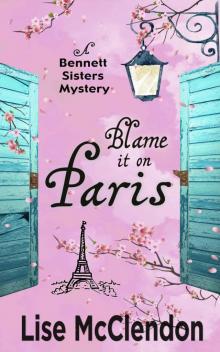 Blame it on Paris (Bennett Sisters Mysteries Book 7)
Blame it on Paris (Bennett Sisters Mysteries Book 7)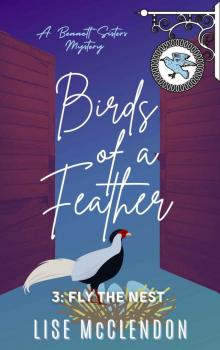 Birds of a Feather: 3: Fly the Nest (Bennett Sisters Mysteries Book 16)
Birds of a Feather: 3: Fly the Nest (Bennett Sisters Mysteries Book 16)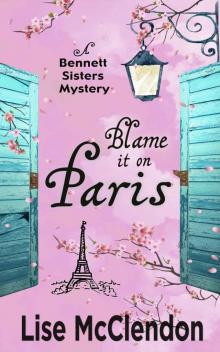 Blame it on Paris
Blame it on Paris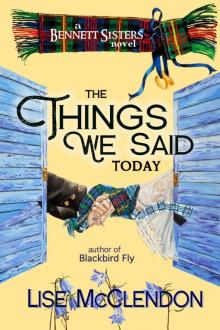 The Things We Said Today
The Things We Said Today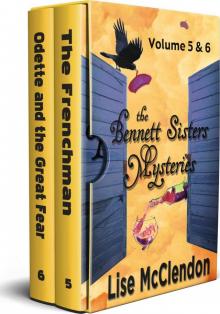 Bennett Sisters Mysteries Volume 5 & 6
Bennett Sisters Mysteries Volume 5 & 6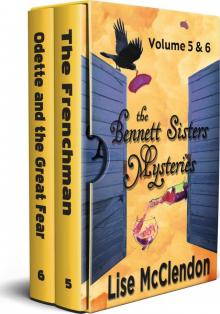 Bennett Sisters Mysteries Box Set 2
Bennett Sisters Mysteries Box Set 2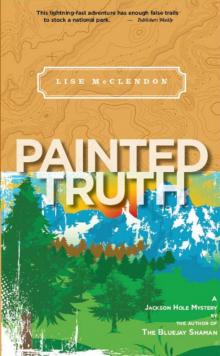 Painted Truth
Painted Truth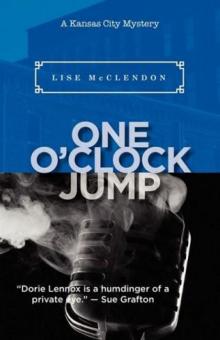 One O'Clock Jump
One O'Clock Jump The Bluejay Shaman (Alix Thorssen Mystery Series)
The Bluejay Shaman (Alix Thorssen Mystery Series) Swing Town Mysteries Dorie Lennox Box Set
Swing Town Mysteries Dorie Lennox Box Set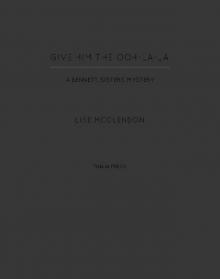 Give Him the Ooh-la-la
Give Him the Ooh-la-la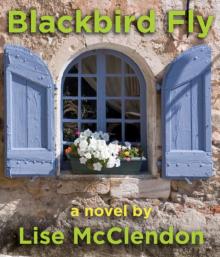 Blackbird Fly
Blackbird Fly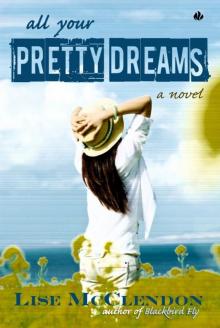 All Your Pretty Dreams
All Your Pretty Dreams Nordic Nights (The Alix Thorssen Mysteries)
Nordic Nights (The Alix Thorssen Mysteries)